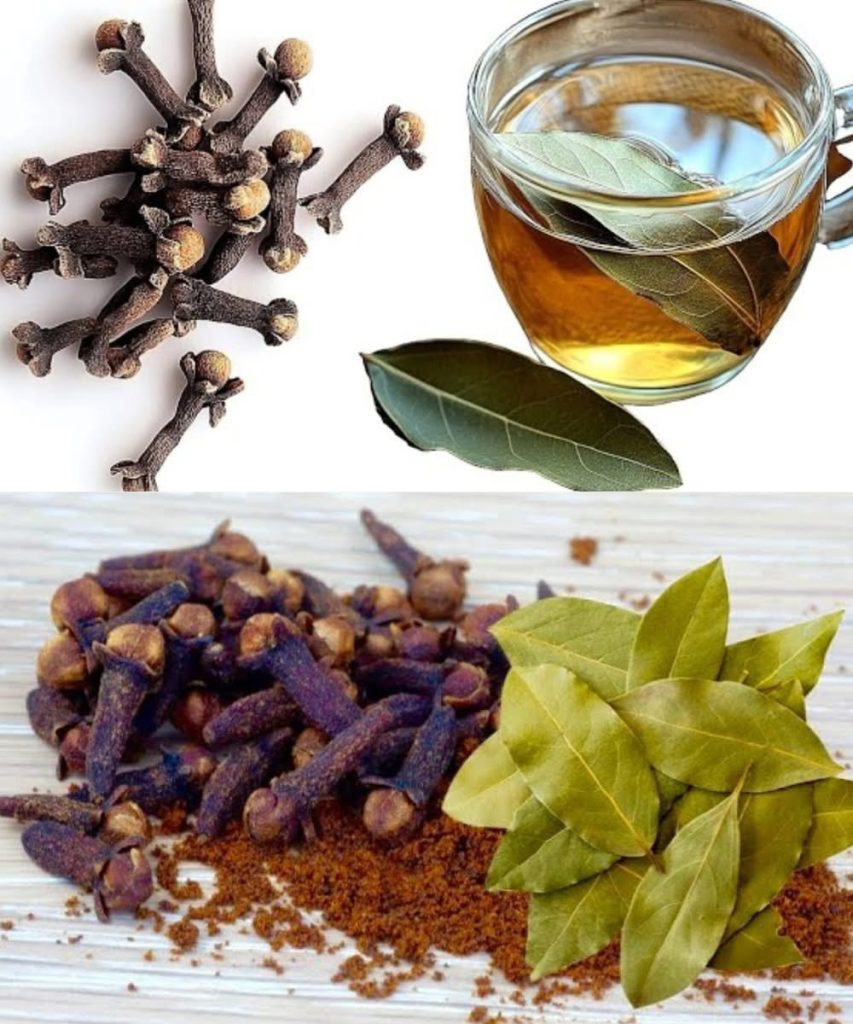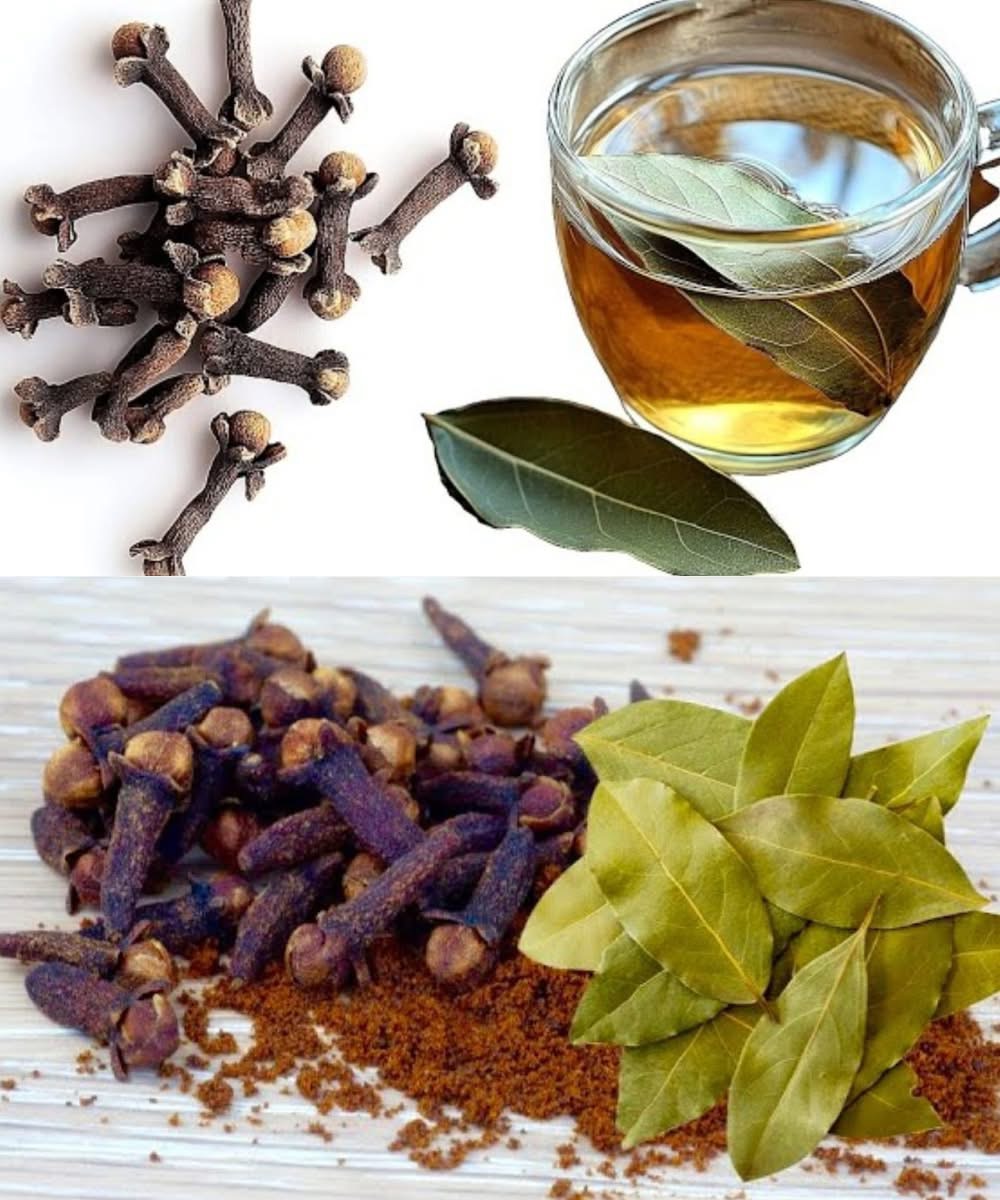
🌿
Clove and Bay Leaf Tea
🍵
A Traditional Herbal Infusion for Wellness and Flavor
📘
Introduction
Clove and Bay Leaf Tea is a traditional herbal remedy that combines the warm, spicy essence of cloves with the subtly floral, slightly bitter notes of bay leaves. This ancient infusion is more than just a drink—it’s a soothing tonic that has been treasured for centuries across cultures for its powerful medicinal properties. Whether you’re seeking digestive relief, immune support, or a relaxing bedtime beverage, this tea is a fragrant, health-boosting solution with deep historical roots and proven benefits.
🧂
Ingredients
(Serves 2)
- 6–8 whole cloves
- 3 dried bay leaves (fresh can be used but less potent)
- 2 cups (500 ml) of filtered water
- (Optional Enhancers):
- 1 tsp honey (for sweetness)
- 1 slice fresh ginger (for extra warmth)
- 1 cinnamon stick (for a spicy note)
- 1 tsp lemon juice (for brightness)
🥄
Instructions
- Boil Water: Pour 2 cups of water into a saucepan and bring it to a boil.
- Add Spices: Once boiling, add the cloves and bay leaves. (Add any optional enhancers at this stage.)
- Simmer: Reduce the heat and simmer for 8–10 minutes, allowing the flavors to fully infuse.
- Strain: Turn off the heat and strain the tea into cups.
- Serve: Add honey or lemon if desired. Sip warm.
🧪
Methods
- Infusion: This method extracts volatile oils and active compounds by simmering cloves and bay leaves in hot water.
- Simmering vs. Steeping: Simmering (gentle boil) is used instead of simple steeping to maximize extraction from the harder clove buds and thick bay leaves.
- Straining: Removes coarse particles and concentrates the flavor for a smooth finish.
📜
History
Both cloves and bay leaves date back thousands of years in medicinal and culinary use:
- Cloves were prized in ancient China, Egypt, and India for their antiseptic and aromatic properties. By the Middle Ages, they were traded across Europe as a luxury spice.
- Bay leaves, sacred to the Greeks and Romans, were symbolic of wisdom and protection. They were used in cooking and medicine, particularly for gastrointestinal and respiratory conditions.
- Together, these herbs were often used in Ayurvedic, Unani, and Mediterranean traditions for holistic healing.
🌟
Benefits
1. Digestive Aid:
Cloves stimulate digestion, reduce gas and bloating. Bay leaves enhance enzyme production and soothe the gut.
2. Anti-inflammatory:
Eugenol in cloves and cineole in bay leaves reduce inflammation and relieve joint pain or headaches.
3. Immune Booster:
Clove’s antimicrobial properties help fight infections. Bay leaf adds vitamin C and folic acid, supporting immunity.
4. Antioxidant Power:
Both spices are rich in antioxidants that protect cells from oxidative damage and aging.
5. Respiratory Relief:
This tea clears sinuses, relieves congestion, and can ease sore throats and coughs.
6. Blood Sugar Regulation:
Cloves may help regulate blood sugar levels, while bay leaves have been linked to improved insulin function.
7. Mental Calm & Focus:
The soothing aroma of this tea relaxes the mind, and its mild stimulant properties can improve clarity.
🧬
Formation (Chemical Profile)
- Cloves contain:
- Eugenol (antiseptic, analgesic)
- Tannins (astringent)
- Flavonoids (antioxidant)
- Manganese (brain function and metabolism)
- Bay Leaves contain:
- Cineole (antiseptic, expectorant)
- Linalool (stress relief)
- Vitamin A, C, B6
- Iron, calcium, magnesium
When steeped in hot water, these compounds dissolve and act synergistically to produce the tea’s therapeutic effects.
🧡
Conclusion
Clove and Bay Leaf Tea is far more than a comforting herbal drink. It’s a union of two ancient spices with rich traditions of healing, packed with nutrients, antioxidants, and essential oils. Ideal for cold evenings, digestive troubles, or simple relaxation, this tea is a wonderful addition to a natural health regimen. Simple to prepare, deeply flavorful, and rich in benefits—it’s the perfect cup of wellness.
👥
Lovers (Who Will Love This Tea)
- Herbal Enthusiasts seeking natural healing.
- Digestive Wellness Seekers needing relief from bloating or nausea.
- Wintertime Sippers wanting a warming, soothing brew.
- Mindful Drinkers avoiding caffeine but desiring mental clarity.
- Traditional Medicine Advocates familiar with Ayurveda or Mediterranean remedies.
🥗
Nutrition (Per 1 Cup, without honey)
| Nutrient | Amount |
| Calories | ~2 kcal |
| Carbohydrates | <0.5 g |
| Vitamin C | ~2 mg |
| Manganese (clove) | ~0.1 mg (5% DV) |
| Antioxidants | High |
| Fat, Protein | Negligible |
Note: Adding honey or lemon slightly increases vitamin content and calories (~15 kcal per tsp of honey).
